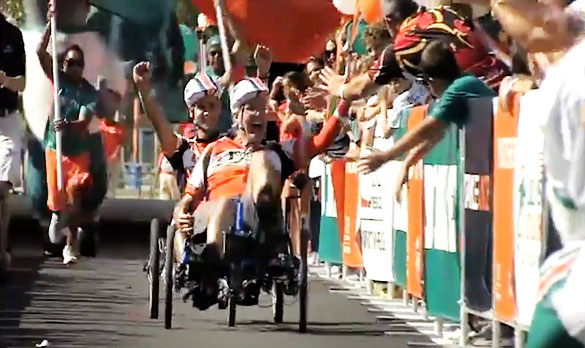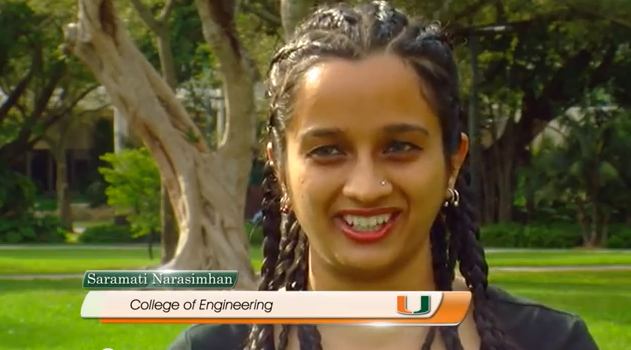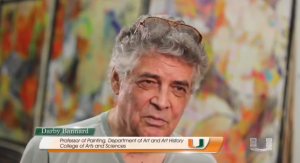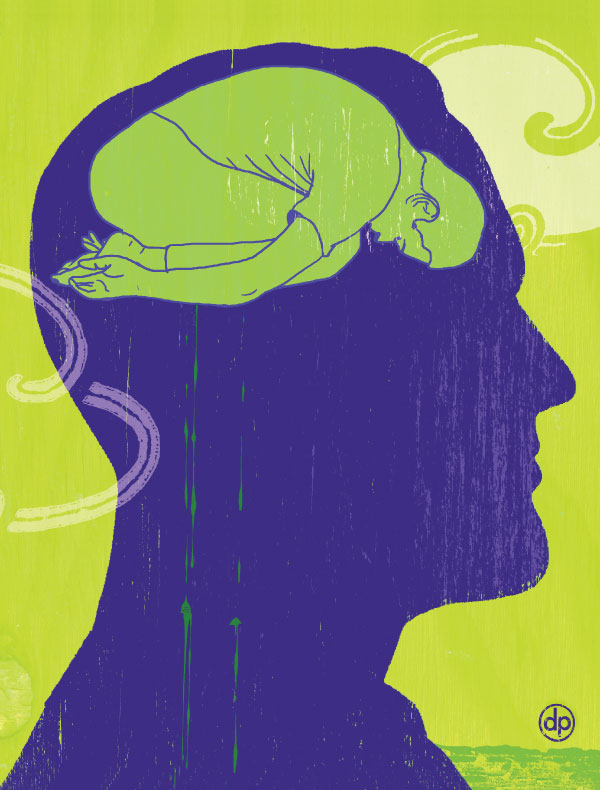

Research suggests practicing mindfulness can build “mental armor,” even under extreme stress.
By Greg Breining
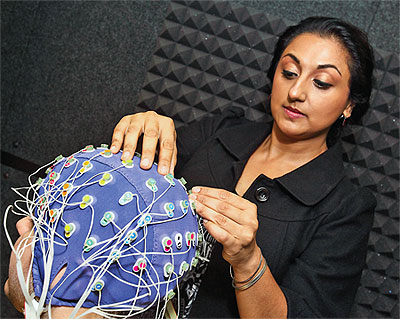
Neuroscientist Amishi Jha investigates the effects the practice of mindfulness has on brain functionality.
That’s the crux of Jha’s research and other mindfulness work at the University—to understand how mindfulness training can help the brain operate better under stress, bolster working memory and attention, and improve the performance and emotional lives of people in all kinds of pressure-cooker professions, from the battlefield to the courtroom.Jha says a great deal of interest in mindfulness training has come from the military. “The interest is in figuring out if it is a viable solution to many challenges the military faces, with so many service members coming home with PTSD and depression, committing suicide, and suffering from a host of other psychological diseases,” she says.
The key is to improve a significant component of cognition—working memory. “Working memory is the ability to maintain and manipulate information over short intervals,” she explains. “It is critical for decision making, regulating emotions, and being able to know what your current state of mind is. Because stress and overuse degrade working memory, we are particularly interested to see if working memory can be strengthened in people facing high-stress, high-stakes situations. That could be law enforcement, combat soldiers, high-performance athletes—a whole range of people could benefit from training to improve their working memory.”
Elizabeth Stanley, a one-time Army intelligence officer, had already recognized the potential of mindfulness training in a military context. The associate professor of security studies at Georgetown University designed an eight-week Mindfulness-Based Mind Fitness Training (MMFT) for soldiers. She and Jha teamed up in 2008 to test its effectiveness.
Jha and Stanley theorized that the stress of pre-deployment training, deployment, and combat may deplete working memory and lead to breakdowns in focus, discipline, verbal ability, and mental health of the kind that has been exhibited by soldiers returning from Iraq.
To see if mindfulness training might provide a kind of “mental armor” to protect working memory, they recruited two groups of Marines preparing for imminent deployment to Iraq, as well as a civilian control group. They tested all three groups in standard exercises—remembering letters while performing simple arithmetic—to determine working memory.
Among the Marines who took part in MMFT was Marine reservist Major Jason Spitaletta. He recalls watching as his fellow service personnel, scattered across a lawn, engaged in yoga poses. In addition to yoga-like postures, their mindfulness exercises included concentrating on breathing to the exclusion of all other distractions, “body scan” exercises that had them shifting their attention to various parts of the body over a 20-minute span, and 30 minutes of “homework” exercises daily.
“The goal is to get to the point where you’re able to identify when your mind is wandering, when the attention to the task at hand starts to slip,” says Spitaletta. “Then you can bring yourself back to a state of heightened awareness.”
Jha’s research found that, compared with the civilian control group, both groups of Marines tended to perform poorly on working memory tests as stress mounted and deployment grew closer. But in the group that received mindfulness training, performance improved among those who consistently practiced the exercises.
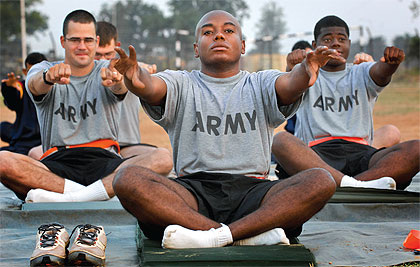
The Department of Defense is interested in learning whether mindfulness-based exercises such as yoga can help soldiers before, during, and after deployment.
Some Marines resisted the mindfulness training, but others, such as Spitaletta, reported that they continued to practice mindfulness, even in Iraq. Spitaletta says he found the skill of snapping his mind to attention useful, especially during boring hours on patrol, often in stultifying heat.“It provided me with a different approach to introspection,” offers Spitaletta, a researcher in the Advanced Concepts and Irregular Warfare Analysis Group at The Johns Hopkins University Applied Physics Laboratory. “I would anticipate my reactions to different things and be able to better manage different frustrating stimuli.”
It was often necessary to keep a tight rein on emotional outbursts in Iraq, he adds, because “Americans and Iraqis respond and react in different ways and at different speeds. Interactions were somewhat stressful for many people.”
Jha and Stanley will continue their military work with more than 200 Army soldiers in Honolulu. With a $1.72 million Defense Department grant, the four-year project will compare the effectiveness of four versions of mindfulness training to the “positive psychology” training the military currently employs to build mental and emotional resilience.
“Our research suggests this type of training is protecting people against the kind of degradation and mental decline that happens as a result of being in a very high-stress situation,” says Jha. “The most encouraging part of the study was that the more people practiced, the more they benefited. It’s not an inordinate amount of practice. The people who benefited were practicing an average of 12 minutes a day.
“The takeaway is that, just like the body, the brain can be trained to be healthier and stronger. Mindfulness training exercises are showing promise as tools to build more attentive, less emotionally reactive brains.”
Another population Jha is focusing on is students. Since 2007 she has been a scientific advisor to the Hawn Foundation, created by actress Goldie Hawn to help children cultivate the social and emotional skills to reduce stress and improve academic performance.
In a collaboration of her lab and Hawn’s foundation, she will be researching the effects of mindfulness training on working memory and academic performance in selected Miami-Dade County public schools.
Mindfulness is already proving useful in another academic setting—law school. One of Jha’s collaborators at UM is Scott Rogers, director of the Mindfulness in Law Program and author of three books on mindfulness for law students and lawyers.
Lawyers have many legal responsibilities—to their clients, opposing attorneys, and others, says Rogers, who teaches “Professional Responsibility and Mindfulness” and “Mindfulness in the Law.”
“Attorneys can, from time to time, not do what they’re supposed to do because they may be afraid, may feel they’re going to lose, or may be really, really angry. We know we want to act honorably,” he adds. “Yet things happen. Thoughts, feelings, and sensations take us by surprise, and we get caught and become reactive. All of a sudden our intentions seem to fly out the window.”
Mindfulness training, explains Rogers, “offers this wonderful opportunity to notice what is arising inside of us so that we gain more mastery over what we do about it.” He and Jha have founded the Mindfulness Research and Practice Initiative, a multidisciplinary academic community of those interested in mindfulness training at UM.
Jha’s mindfulness research has attracted interest not only from Hawn, but the Dalai Lama, leaders at the Pentagon, and members of Congress. Yet it represents only part of her role at UM. In 2010 Jha was recruited here from the University of Pennsylvania to help spearhead the development of a 37,700-square-foot neuroscience facility, slated for completion in summer 2013 on the Coral Gables campus.
Jha says the new neuroscience building, funded with a $14.8 million grant from the American Recovery and Reinvestment Act awarded by the National Institutes of Health, will put the University among the ranks of just a few other top-flight U.S. institutions investigating the brain’s ability to change itself using contemplative techniques such as mindfulness.
“We’re bringing wisdom traditions and cutting-edge neuroscience together to see if we can help make the brain healthier,” she says. “My goal is to build a University-wide center with a research emphasis on mindfulness, paired with training opportunities for students and the broader University community, South Florida residents, and people from around the world who are interested in optimizing their ability to pay attention and be calm.”
VIDEO: Amishi Jha discusses her mindfulness research here.
Mindfulness over Matter
Stress leads scientist to new realm of investigation.
Today cognitive neuroscientist Amishi Jha is a rising star in the field of working memory and attention research, but early in her career she almost quit academics to escape the kind of stress her current research is trained on helping us better understand and cope with from a neurological perspective.
Jha’s research initially focused exclusively on basic research questions involving brain mechanisms of working memory, the capacity to remember disparate bits of information while juggling tasks and blocking out distractions.
But after a few years as a professor and researcher, she found herself feeling burned out by the topic.
“The questions didn’t feel compelling, and I was getting the growing sense that my interests could not be sustained by bench science alone. It felt to me that there were many challenges outside the lab—in the real world—that could use input from scientists like myself.”
At the same time, Jha was raising a young child, running a lab, and teaching classes. With her own stress level mounting, she contemplated quitting her job.
Then she encountered mindfulness at a lecture by the renowned practitioner and neuroscientist Richard Davidson from the University of Wisconsin. She was captivated by side-by-side images of a brain, one in a positive state and the other in a negative one. She raised her hand and asked Davidson, “How do you get that brain to look like that other brain?”
“Meditation,” Davidson said—flippantly, Jha thought.
Nonetheless, she picked up a little book called Mindfulness for Beginners, and committed to a self-guided course, hoping, she recalls, to clear the fog from her own mind and feel less stressed.
It worked, she recalls.
“I realized that the thing that was changing in my own mind was something I knew a lot about from the research side, but not experientially—my ability to control my own attention. That’s when I decided I might be able to investigate mindfulness using the tools of bench science.
“Working memory and attention are still central to my research, but now I delve into questions about if and how mental training can strengthen the brain’s systems of attention and working memory.”
This slight pivot in Jha’s research focus seems to have done the trick to curb her own burnout. She is passionate and energized by the notion of spending a long career exploring the mysteries of the brain with an eye toward solving the challenges of a culture that is chronically stressed, overwhelmed, and driven-to-distraction.
—Greg Breining


 Follow
Follow

